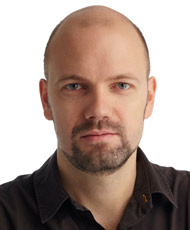
Josef Pradler
Group Leader Theory New Physics
Theory New Physics
Theory New Physics
Contact
Email: Josef.Pradler(at)oeaw.ac.at
Telephone: +43 (1) 51581 - 2811
Location: Postsparkasse
Room: 3rd floor
Biographical sketch
Positions
- since February 2023 Assistant Professor at the University of Vienna
- since September 2020 Board Member of the Austrian Science Fund FWF (Kuratorium)
- since June 2018 Research Group leader at HEPHY (tenured position)
- 2022 Scientific Associate at the CERN Theory department
- 2014-2018 Junior Research Group Leader at HEPHY
- 2012-2014 Postdoctoral Fellow, Dept. of Physics and Astronomy, Johns Hopkins University, Baltimore, USA
- 2009-2012 Postdoctoral Fellow, Perimeter Institute for Theoretical Physics, Waterloo, Kanada
Education
- 2005-2009 Masters and Doctoral studies at the Max Planck Institute for Physics, Munich, Germany
- 2000-2005 Study of Physics, University of Vienna
Funding
Grants and Scholarships
- since Feb 2023 ERC Consolidator Grant "New Light on Dark Matter" (NLO-DM)
- since May 2020 Coordinator and Principal Investigator FWF Research Group "STRONG-DM"
- since Jan 2018 Faculty at the Doctoral College "Particles and Interactions" DKPI
- since June 2014 New Frontiers Group Grant by the Austrian Academy of Sciences
- 2016 - 2019 EU COST action "Connecting Insights in Fundamental Physics" member
- 2006 - 2009 International Max Planck Research School on Elementary Particle Physics
- 2002 & 2003 Scholarship for distinguished achievements by the University of Vienna
Awards
- 2016 Hans und Walter Thirring Prize by the Austrian Academy of Sciences
- 2015 AScINA Young Principal Investigators Award
- 2015 Ludwig Boltzmann Award by the Austrian Physical Society
- 2007 Helmholtz Young Researcher Prize for Astroparticle Physics
Professional Service
Supervision
PhD Students
- Garance Lankester-Broche
- Stefan Nellen Mondragon
- Marco Nikolic
- Jui-Lin Kuo (graduation 2021; private industry Taiwan)
- Lukas Semmelrock (graduation 2020, now staff at Austrian Institute of Technology)
Master Students
- Lukas Matzi (graduation 2020)
- Marco Nikolic (graduation 2019)
- Christina Xeni (graduation 2018)
- Lukas Semmelrock (graduation 2016)
Teaching
Courses at the University of Vienna
- VO The search for new physics: from theory to tabletop experiments (WS2019/20)
- VO Field Theory Methods in Cosmology and Astroparticle Physics (WS2017/18)
- VO Advanced Topics in Particle Physics, WS2016/17, WS2018/19 (joint lecture)
Lecturer at international schools
- International school on muon g-2 and hadronic effects 2018; Novosibirsk State University, Russia; Lectures on light dark sectors
- DK Indian-Summer School 2015, Internationale Academy Traunkirchen; Lectures on Dark Matter and Cosmology
Selected presentations
New Pathways for Physics Beyond the Standard Model, University of California Berkeley, USA
How to break a no-go theorem in direct detection (Eingeladener Konferenzvortrag), 17-06-16
Cosmological Probes of Fundamental Physics, Weizmann Institute of Science, Israel
Big Bang Nucleosynthesis as a Probe of New Physics (Eingeladener Konferenzvortrag), 09-06-16
Stanford University, USA
Dark Photons Dark Matter, Dark Axions Dark Energy (Seminarvortrag), 23-03-15
Beyond WIMPs: From Theory to Detection, Hagoshrim, Israel
Dark Photon Dark Matter: Theory and Constraints (Eingeladener Konferenzvortrag), 31-05-15, PDF
Gran Sasso National Laboratory, Assergi, Italy
New Opportunities for Dark Matter Experiments (Kolloquium), 10-03-15, PDF
Perimeter Institute for Theoretical Physics, Waterloo, Canada
Astrophysical and cosmological aspects of feebly-interacting light species (Eingeladener Konferenzvortrag), 17-06-14
University of California Berkeley, USA
The Universe at redshift one billion: a cosmic particle physics lab (Seminarvortrag), 17-03-14
Institute for Advanced Study, Princeton, USA
Dark Photons in Cosmology, Astrophysics, and Experiment (Seminarvortrag), 14-05-13
Research interests
Much of my research efforts revolve around finding novel signatures of physics beyond the Standard Model and to devise strategies to experimentally test them. I deem such work as very important as it creates new perspectives and science cases for existing and future experiments. I am also thrilled by the prospect that a non-gravitational detection of Dark Matter and a conclusive test of the paradigm is a realistic possibility within the next decade. Therefore, I am pushing my research towards the exploration of laboratory tests of Dark Matter.
The physics of the early Universe, and, in particular, the physics framework of Big Bang Nucleosynthesis are further active lines of my research. I am interested in exploring various generation mechanisms of Dark Matter and to look for cosmological signatures of the hidden sector. Upcoming precision determinations of deuterium and helium abundances, together with the still unsolved cosmological lithium problem keeps primoridal nucleosynthesis a most important window to test for deviations from Standard Model during those first seconds after the big bang.